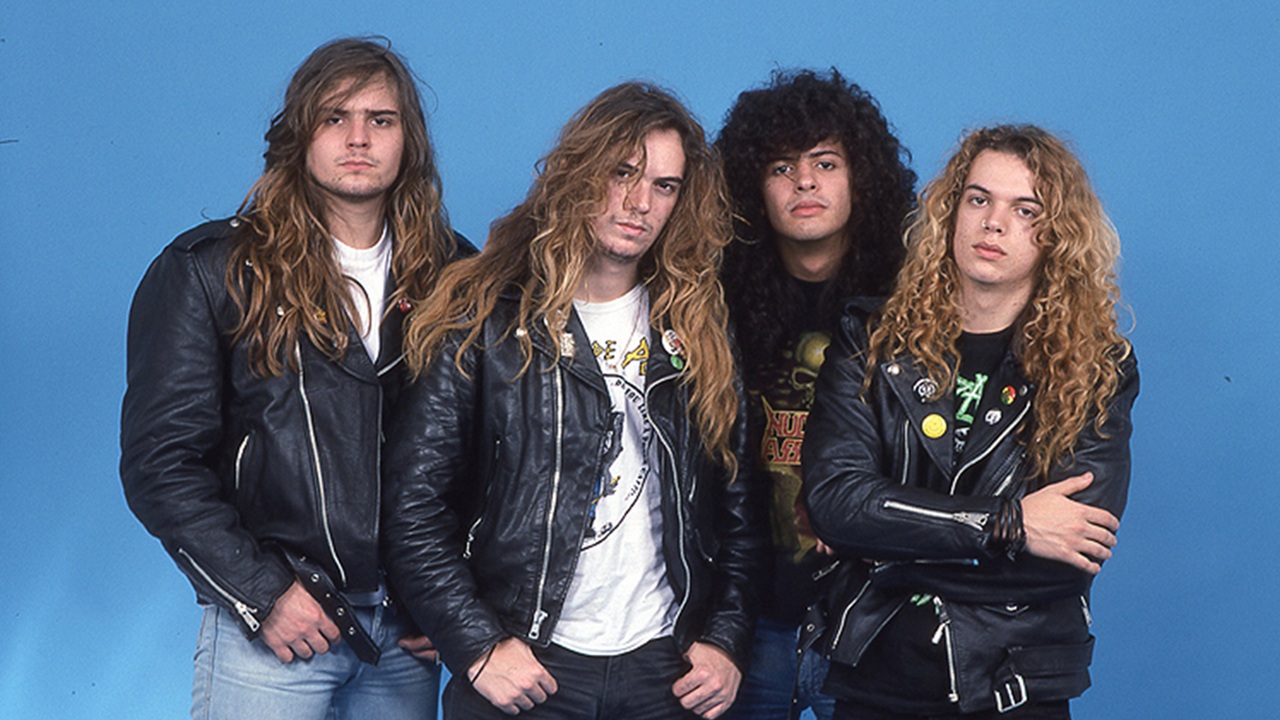The 9 best music books from 2022
Here are 2022's finest reads offering illuminating and entertaining insights into lives profoundly shaped by music

Select the newsletters you’d like to receive. Then, add your email to sign up.
You are now subscribed
Your newsletter sign-up was successful
Want to add more newsletters?

Every Friday
Louder
Louder’s weekly newsletter is jam-packed with the team’s personal highlights from the last seven days, including features, breaking news, reviews and tons of juicy exclusives from the world of alternative music.

Every Friday
Classic Rock
The Classic Rock newsletter is an essential read for the discerning rock fan. Every week we bring you the news, reviews and the very best features and interviews from our extensive archive. Written by rock fans for rock fans.

Every Friday
Metal Hammer
For the last four decades Metal Hammer has been the world’s greatest metal magazine. Created by metalheads for metalheads, ‘Hammer takes you behind the scenes, closer to the action, and nearer to the bands that you love the most.

Every Friday
Prog
The Prog newsletter brings you the very best of Prog Magazine and our website, every Friday. We'll deliver you the very latest news from the Prog universe, informative features and archive material from Prog’s impressive vault.
In the summer of 2020, the closure of Q magazine, the UK's most mainstream, music industry-friendly and 'respectable' print music title, saw broadsheet newspaper arts and culture section editors commission NME / Melody Maker alumni to write reverential requiems for the sad demise of the nation's once proud, noble and undeniably influential music press since the glory days of mid '90s Cool Britannia.
Reading these wistful, nostalgic, self-important elegies, one could have easily come away with the impression that future generations of music fans would be left bereft and culturally impoverished without the reassuringly familiar faces of Liam Gallagher, Paul Weller, Noel Gallagher, The Jam, The Beatles and - 'ave it! - Liam and Noel from Oasis ('Knebworth '96: Where Were YOU While We Were Getting High?') staring out from newsagents' racks in monthly rotation.
Snarking aside - for the record, Q was more 6 Music than Radio 2 when it was shuttered - in reality, coverage of the full, diverse spectrum of modern music has rarely been stronger, more informed, more insightful or more accessible across print, online, podcasting and social media platforms. In addition to a welcome democratization and diversification of critique and analysis beyond old school media gatekeepers, 2020/2021 also saw the emergence of two new smartly-curated music list publishing imprints - Nine Eight and White Rabbit - and both are now thriving, playing their part in making the past 12 months an unprecedented boom period for high quality music writing.
Here, in no particular order, are nine of the best titles, published this year, which offer fresh, illuminating and entertaining insights into a range of disparate lives lived in thrall to and profoundly shaped by music, for better or for worse.

Ten Thousand Apologies: Fat White Family and the Miracle of Failure

"A roar went up as I unbuckled my belt, pulled down my suit trousers and began to squat. Forcing a stream of tar-black, speed-infused anxiety into my cupped hands, I spread this warpaint from within right across my face. Like some Native American dignitary having readied himself for a quest of flesh and honour, I proceeded to confront my flock head on and marched through the crowd like Moses crossing the Red Sea..."
Lias Saoudi's recollection of Fat White Family's second-ever gig in Sheffield serves notice that Ten Thousand Apologies... is a band biography like no other. Written in collaboration with award-winning West Yorkshire novelist/author Adelle Stripe, who beautifully frames the vocalist's searingly honest, occasionally terrifying anecdotes with rich contextual colour, it's a wild, exhilarating read, which deftly avoids categorisation as either a cautionary tale or a celebration of nihilistic excess.
A text worthy of being filed alongside the late Mark Lanegan's gripping and glamour-free 2020 memoir Sing Backwards And Weep, it vividly captures the anarchic, free-spirited Brixton collective's disdainful disregard for the music industry playbook and conventional social niceties, illustrated by a wealth of pitch-black tales of self-sabotage, addiction and seemingly endless conflict.
Buy Ten Thousand Apologies: Fat White Family and the Miracle of Failure
Corporate Rock Sucks: The Rise and Fall of SST Records
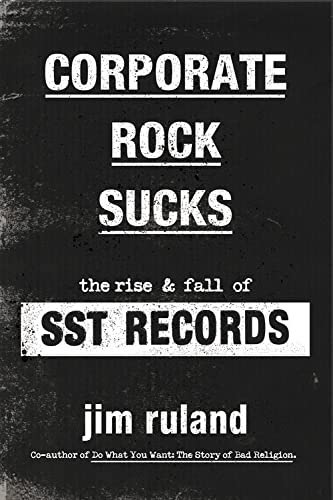
Having co-authored the official Bad Religion biography Do What You Want and former Black Flag/Circle Jerk's frontman Keith Morris memoir My Damage, Jim Ruland turns his gaze towards SST Records, arguably the most-influential independent label in modern rock history.
In the first six months of 1984 alone, Black Flag guitarist Greg Ginn's label released Black Flag's My War, Hüsker Dü's double disc concept album Zen Arcade, the self-titled debut album by influential doom metallers Saint Vitus, and Meat Puppets II, featuring two songs - Lake Of Fire and Plateau - which long-time fan Kurt Cobain insisted Nirvana cover at their their 1993 MTV Unplugged show. And this was before the label released seminal albums by Soundgarden, Sonic Youth, Bad Brains and Dinosaur Jr.
The DIY label's messy history - SST was buffeted by legal hassles, police harassment, financial woes, mismanagement, petty jealousies and the stubborn whims of its mercurial founder - is quite a tale, and its related here in unflinching detail, making Corporate Rock Sucks as much an autopsy as a celebration of defiant 'fuck you' punk rock ethics.
In the sleeve-notes for 1983 SST compilation The Blasting Concept, LA writer Harvey Kurbernik hailed the label as a "house of freedom", an aesthetic which once led Henry Rollins to oversee plans for a new Charles Manson album, to be titled Completion, an idea only dropped in the wake of SST employee (and former Black Flag bassist) Chuck Dukowski receiving death threats after test pressings were cut.
Reading Ruland's forensic text, it seems remarkable that SST's implosion in the '90s didn't come sooner, but for all its mis-steps, the label's pivotal role in laying the groundwork for that decade's alternative rock explosion is undeniable, and Corporate Rock Sucks should inspire a new generation of outliers to seek out some of the most thrillingly uninhibited art to emerge from the punk rock underground.
Buy Corporate Rock Sucks: The Rise and Fall of SST Records
The latest news, features and interviews direct to your inbox, from the global home of alternative music.
Running Up That Hill: 50 Visions of Kate Bush
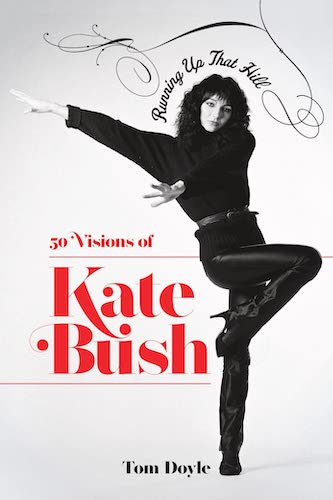
With fabulously fortuitous timing, MOJO writer Tom Doyle's respectful and revealing biography of Kate Bush emerged just months after a large chunk of the music-listening world was awakened to her genius via the inclusion of 1985 single Running Up That Hill in a pivotal scene in Netflix's sci-fi drama Stranger Things.
For new Bush devotees, Doyle's text, pivoting around a four hour interview conducted with the famously publicity-shy English singer-songwriter ahead of the release of 2005's Aerial, serves as an ideal introduction to the artist's music, mindset and methodology. But this is no cash-in bluffer's guide: those with longer term emotional investments in one of modern music's most revered talents have already identified it as the best book ever written about Bush.
Signed to EMI Records in 1975 on the strength of demoes financed and produced by Pink Floyd's David Gilmour - "By the time I was about sixteen I was on a mission from God, y'know" she informs Doyle with a smile on her face - Bush has fashioned a stunning body of work on her own terms and on her own timetable, a state-of-affairs her label's most senior executives have long-since recognised as a non-negotiable. In the portrait painted by Doyle's insightful, sympathetic text she emerges as fiercely intelligent, gifted, grounded and gracious, and also, crucially, acutely self-aware and self-possessed.
"I just find it frustrating that people think I'm some kind of weirdo recluse that never comes out into the world," she tells the writer at one point. "I'm a very strong person and I think that's why I find it really infuriating when I read... 'she's not very mentally stable, just a weak, frail little creature'. It's like... Fuck off!"
Buy Running Up That Hill: 50 Visions of Kate Bush
Faith, Hope and Carnage
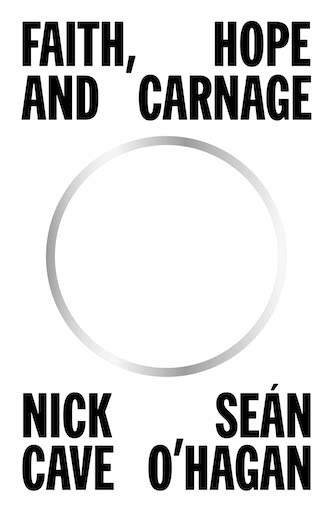
"Songs have the capacity to be revealing, acutely so. There is much they can teach us about ourselves. They are little dangerous bombs of truth."
Based upon almost 40 hours of peak-pandemic phone conversations between Nick Cave and his friend, Northern Ireland-born arts writer Sean O'Hagan, Faith, Hope and Carnage is a thoughtful, meditative reflection upon art, friendship, music, grief, faith, ego, creative collaboration, love, mortality and legacy.
Cave has described it as "a strange, risky, unorthodox book", and it undeniably stretches far beyond the boundaries of a conventional memoir to offer a portrait of a still-evolving visionary artist who has come to recognise, embrace and cherish profound new truths. Conversational, candid and imbued with Cave's sharp wit and wisdom, it's a fascinating insight into a singular artist who has never stopped seeking.
Spaceships Over Glasgow: Mogwai, Mayhem and Misspent Youth
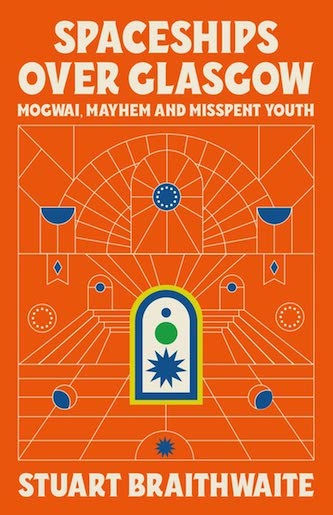
Billed by publishers White Rabbit as "a love song to live rock and roll", Mogwai frontman Stuart Braithwaite's first memoir is so much more than that.
While his recollections of seeing Nirvana, Iggy Pop, The Velvet Underground, My Bloody Valentine and more as a teenager brilliantly evoke the heady euphoria of the best live shows - Nirvana's November 29, 1991 show at Edinburgh's Carlton Studios is remembered as "some kind of epiphany" - it's when Braithwaite and his misfit pals gatecrash the decade's alternative music scene that Spaceships Over Glasgow truly takes flight. Even if, in gleefully embracing that scene's hedonistic delights with whole-hearted relish, it's sometimes a wonder he can recall anything at all.
A case in point: given a 'proper' budget to record Mogwai's third album Rock Action in New York, upon pitching up in Manhattan Braithwaite decides that his time would be better spent going on "a colossal bender."
"I barely went into the studio for the entirety of the trip," he admits, shame-free. "I had money for the first time in my life and was single in the greatest city in the world. It was basically non-stop..."
This, frankly, is how many of us would react if suddenly gifted a golden ticket to run amok in the music business with our best mates, so fair fucks. Few of us, however, would have the talent and fortitude to hold our shit together amid this maelstrom, and author a body of work wholly untainted by dishonest intentions, for an ever-expanding fanbase, to the point where 26 years into their endearingly unscripted career, Mogwai scored their first number one UK album in 2021with As The Love Continues.
Who doesn't love an underdog story where the good guys actually emerge smiling? Told with heart, humility, black humour, zero pretension, and an admirably undiminished lust for life, Braithwaite's publishing debut is a genuine delight.
Buy Spaceships Over Glasgow: Mogwai, Mayhem and Misspent Youth
Fingers Crossed: How Music Saved Me from Success
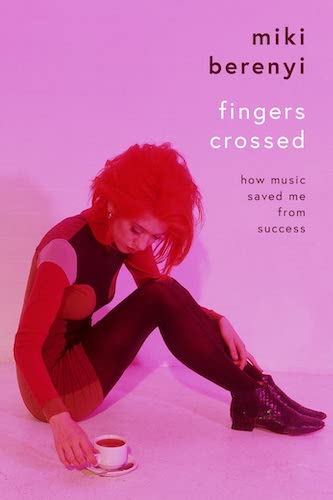
Every word of praise lavished upon former Lush vocalist/guitarist Miki Berenyi's autobiography is utterly merited. But, uniquely for a music memoir, Berenyi's recollections of her formative years are arguably even more fascinating than her brilliantly incisive, remarkably unsentimental account of fronting the 4AD band alongside guitarist and main songwriter Emma Anderson, as an intense friendship forged at an elite London private school becomes ever-more complicated, competitive and challenging.
That a teenage memory of Prince [now King] Charles knocking on the door of the home she shared with her mother and step-father in Windsor, politely inquiring if he (and his bodyguard) might possibly be permitted to step inside for a tour of the property doesn't even rank among the top 50 most memorable anecdotes in Fingers Crossed... should give some indication of the enthralling nature of the richly observed, piercingly honest and, at times, heart-wrenching and horrifying story which unfolds in its pages.
Relentlessly bruised but never broken by a dysfunctional, frequently abusive and violently unstable upbringing, an anxious, adventurous teenage Berenyi initially finds a measure of acceptance and happiness in London's fecund and seemingly open-minded indie rock community, but quickly comes to recoil from its petty jealousies, performative camaraderie, thinly-veiled racism and unapologetic sexism. Long since divested of any compulsion to stroke fragile male egos, Berenyi's scathing single-sentence skewerings of the emerging BritPop scene's boorish man-child 'faces' - Liam Gallagher, Bobby Gillespie, Damon Albarn - is delicious, albeit scant consolation for their shitty behaviour to her back then. "I've been subsumed in music since my teens and found my tribe, my family," she writes, balancing anger and sadness as she revisits the era. "Now it's been hijacked by elitist dickheads."
As BritPop explodes, it doesn't take long for full-on disenchantment to descend upon Lush, now stumbling from minor victories to thudding disappointments: by now Berenyi's surrogate family is every bit as fractured as her relationships with her self-centred, responsibility-shirking parents. Increasingly tired of forcing a smile, she admits to becoming "chippy and hostile and often a bit of a cunt." Soon enough, only thoughts of Lush's inevitable implosion offer hints of relief... but any flickering hopes bound in with thoughts of a new beginning are savagely and tragically extinguished for all concerned when drummer Chris Acland takes his own life in October 1996.
"I knew from the moment he died that there was no future," Berenyi admits. "He was the happy soul of Lush and without him it's pointless and empty."
Reading back through this synopsis of Fingers Crossed... I'm aware that it paints a rather bleak and depressing picture of Miki Berenyi's acclaimed book. Beyond her personal experiences, in its depiction of the mid '80s to mid '90s British indie rock scene, it's not a text which ever shies away from exposing the grime beneath the glamour, which is not what everyone wants to see in a music memoir. But with its candour, honesty and fearlessness, this is a genuinely astonishing book, perhaps the very best music title of 2022. Even if you're not overly familiar with Miki Berenyi's music, after reading Fingers Crossed... you'll never, ever forget her journey.
Buy Fingers Crossed: How Music Saved Me from Success
Punk Paradox: A Memoir
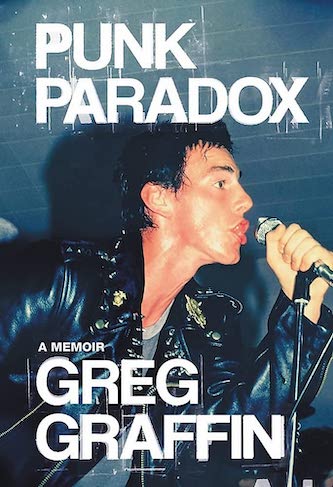
With the filthy, furious Sex Pistols, The Clash, Ramones and New York Dolls yet to form, from where did future SoCal punk rock trailblazer/godfather Greg Graffin of Bad Religion draw inspiration as an angst-ridden and alienated teenager one might occasionally wonder?
From the raw power of The Stooges or MC5 perhaps, or the rough, rowdy garage rock rumble of The Sonics and The Barbarians, or possibly from the seductive darkness, danger and deviancy promised by The Velvet Underground? Not so, if the 58-year-old singer's words in his just-released memoir Punk Paradox are to be trusted. In reality, it says here in black type, the adolescent Graffin's raging fires inside were first stoked by - double checks - the work of English musical theatre legends and future Knight Bachelors Sir Andrew Lloyd Webber and Sir Tim Rice.
"Jesus Christ Superstar," Graffin specifies in Chapter 4 (Musician Ignition). "It was intellectually challenging and stimulating to see the story of Jesus framed a a cult of personality. It was my first indication of countercultural style in music. It was educational... It displayed incredibly proficient musicianship and masterful lyrics. It set a standard for what greatness sounds like."
"The way it’s presented, by Andrew Lloyd Webber," Graffin told Spin last month, "is that this guy was the first punk."
It's unexpected nuggets such as this, allied to traditional punk rock memoir rites-of-passage - a dysfunctional childhood, terrifying clashes with the LAPD, street-fights with easily-triggered jocks, the life-changing power of early Black Flag gigs - which ensure that even if you stumped up for official Bad Religion history Do What You Want just two years ago, there's much to commend in Graffin's thoughtful, thorough autobiography. Not least confirmation that he's not yet finished with punk rock.
"Punk is a resilient art form," he says, "and it’s had many kinds of ebbs and flows, and it’s gone in directions nobody could have predicted, and that has not destroyed my desire, one bit, to continue making contributions to it."
Buy Punk Paradox
Surrender: 40 Songs, One Story
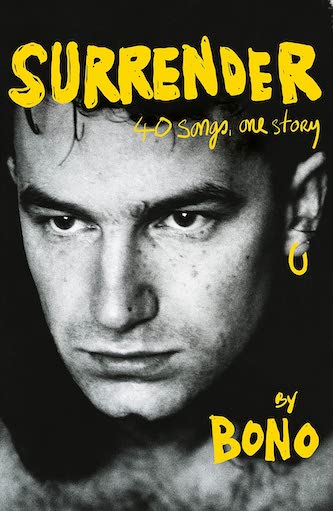
It'll come as little surprise to anyone with even the faintest working knowledge of U2 that their frontman is overly fond of the sound of his own voice. It's just one of the many criticisms you'll hear levelled against Bono by those who profess to despise the man, perfectly sane individuals who, given a binary choice, would opt to gouge out their own eyes with a teaspoon in preference to cracking the spine of this forbiddingly-chunky 576-page career-spanning memoir from the garrulous 62-year-old Dubliner.
So we're not going to attempt to give you the hard sell on this one... except to caution you that if you don't buy it, then - in an echo of U2's generosity in bestowing every iPhone user worldwide a free copy of Songs Of Innocence album in 2014: "The part of me that will always be punk rock thought this was exactly what the Clash would do" the moderately repentant singer writes here - there's a distinct possibly that he'll break into your house this weekend and sneak a hardcover copy onto a book shelf, anyway, just for a laugh. Then break into all your friends' houses and do the same, blaming you. Because Bono, just like Santa, moves in mysterious ways, and as Surrender makes abundantly clear, despite all U2's phenomenal success, he's still a scrappy little fucker who doesn't like hearing the word 'No'.
Your choice, obviously.
Buy Surrender
The Come Up: An Oral History of the Rise of Hip-Hop
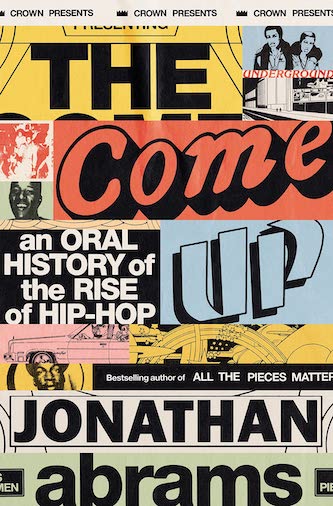
First published in 1997, Please Kill Me, Legs McNeil and Gillian McCain's fabulously entertaining, riotous multi-angle document of the birth and development of punk rock remains the definitive blueprint for scene/genre-specific oral histories of music. Drawing upon over 300 interviews, The Come Up promises to become an equally sacred text for hip-hop, charting the birth of the genre in The Bronx in the 1970s as punk rock germinated on Manhattan's Lower East Side.
Like Please Kill Me, Jonathan Abrams' book paints a vivid picture of a great city on its knees, and a frustrated, fearless community building a brand new world without grand designs or, crucially, without seeking anyone's permission, causing any number of confrontations with the NYPD. Several commentators here point to the looting which swept New York during the July 1977 as pivotal: "Prior to that, the majority of aspiring DJs didn’t have two turntables and a mixer or the speakers," explains Grandmaster Flash & The Furious 5's Rahiem. "And when the lights came back on in New York City, everybody had DJ equipment."
You won't find such confessions from hip-hop's biggest names in these pages, as the likes of Jay-Z and Nas are absent, but their non-participation frees up space for unsung heroes previously overlooked or ignored in more superficial primers. Not everyone is on the same page, obviously, but conflicting stories and stories of conflict only add to the colour and a sense of the chaotic, free-style DIY energy which fuelled the scene's expansion across first a city, then a continent, then the planet.

A music writer since 1993, formerly Editor of Kerrang! and Planet Rock magazine (RIP), Paul Brannigan is a Contributing Editor to Louder. Having previously written books on Lemmy, Dave Grohl (the Sunday Times best-seller This Is A Call) and Metallica (Birth School Metallica Death, co-authored with Ian Winwood), his Eddie Van Halen biography (Eruption in the UK, Unchained in the US) emerged in 2021. He has written for Rolling Stone, Mojo and Q, hung out with Fugazi at Dischord House, flown on Ozzy Osbourne's private jet, played Angus Young's Gibson SG, and interviewed everyone from Aerosmith and Beastie Boys to Young Gods and ZZ Top. Born in the North of Ireland, Brannigan lives in North London and supports The Arsenal.
